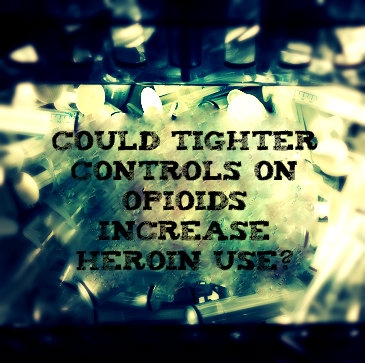Why Tighter Controls On Opioids Could Increase Heroin Use
Prescription painkiller abuse has grown large enough to gain the attention of pharmaceutical companies, doctors, addiction experts, and even the federal government. There are things which can be done to try and halt the abuse of prescription medications. However, those in the know say that when access to opioids is shut down, we can expect substance abusers to move on to heroin.
Made from a synthetic form of opium, opioids are heavy-duty pain relievers like Oxycodone (Percocet), Hydrocodone (Vicodin), OxyContin (a longer-lasting form of Oxycodone) and codeine. Hydrocodone and Oxycodone are usually mixed with aspirin or acetaminophen to produce longer-lasting pain relief.
 Opioids – Number One Prescribed Medication – Problem In The U.S.
Opioids – Number One Prescribed Medication – Problem In The U.S.
Opioids are the number one prescribed medication in the nation and are responsible for the vast majority of drug-related injuries and fatal overdoses, partly because people view them as safer than street drugs. Their wide availability means more drugs are in the hands of abusers.
Most opioid addicts started with a doctor’s prescription for a legitimate need. People who take more pills for a longer period than was prescribed can easily become addicted. Young people who use them recreationally can also quickly form a habit.
Thomas McClellan, the former Deputy Director for the White House Office of National Drug Control Policy, says if we can address these three issues the problem could be controlled:
3 Opioid Issues
- Over-Prescribing – Doctors want to control pain because it promotes healing and fosters a strong doctor-patient bond. Banning opioids outright will not work, but perhaps changing the standards of care which guide prescribing could.
- Insufficient Monitoring – Efforts are underway in most states to establish state-level monitoring programs. Under these programs every doctor who prescribes, patient who picks up and pharmacy that fills a controlled drug prescription will go on record. This should help reduce over-prescribing by doctors and keep patients from going from doctor to doctor in search of prescriptions.
- Patient Misuse – The Federal Drug Administration would like to see Hydrocodone reclassified to Schedule II so that it would have more oversight and be less accessible to patients. Under Schedule II constraints such as limiting automatic refills could help to reign in misuse.
How Tightly Controlling Opioids Could Increase Heroin Use
Would these measures stop painkiller abuse? Perhaps. But even if we succeed, experts predict that drug use will simply shift to another opiate: heroin.
Opioids are synthetic opiates (forms of opium) while heroin is a non-synthetic form. In other words, the drugs are somewhat related and produce similar results. Heroin costs about one half as much as synthetic opioids. So if opioids become more expensive and harder to get, experts predict that users will just switch to heroin.
Communities need to be ready for the shift that will most likely happen as a result of opioid crackdowns. The next question will be how to handle the heroin crisis.
If you or a love one needs help finding a drug rehab facility contact an Elements Recovery Advisor now! 855-763-6488



